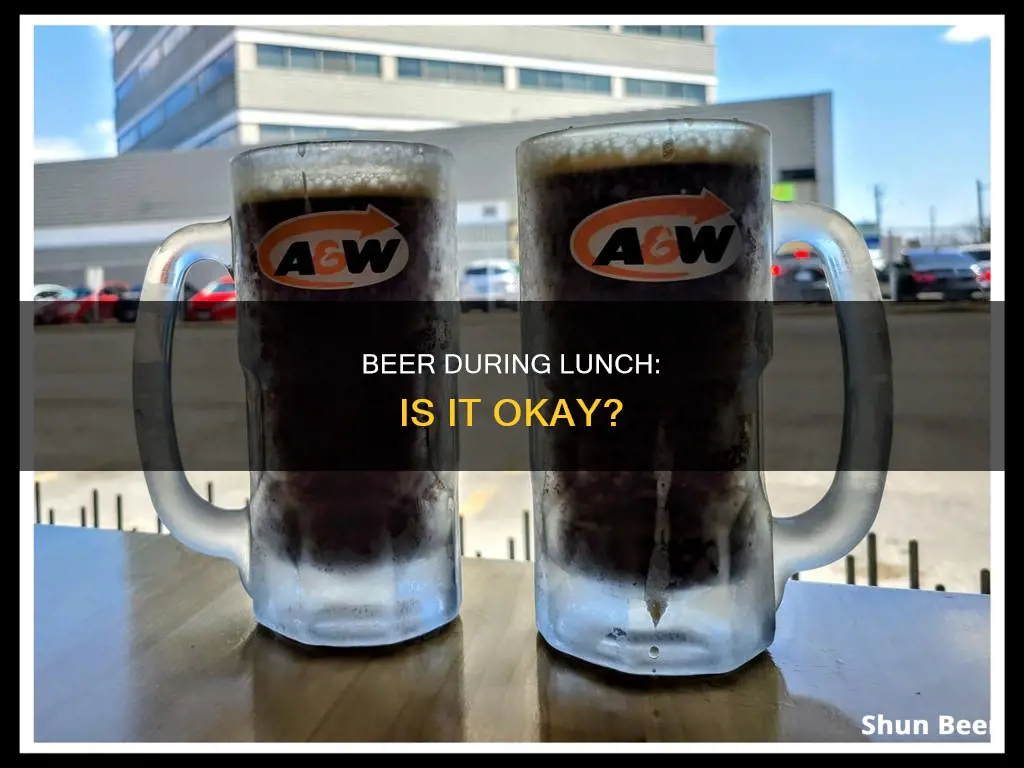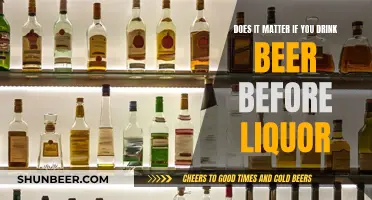
Drinking alcohol during your lunch break is a controversial topic. While some people believe that having a beer with lunch is acceptable, especially if it's followed by a stroll back to the office, others argue that it's unprofessional and inappropriate. Some companies have strict policies prohibiting alcohol consumption during work hours, while others allow it in moderation or during special occasions. Ultimately, it's important to know your limits and be aware of company policies and local laws to avoid any negative consequences.
| Characteristics | Values |
|---|---|
| Acceptability of drinking beer during lunch break | Depends on the company's policy and the employee's profession |
| Legality of drinking beer during lunch break | Legal in some states, but employers can fire employees for drinking during work hours |
| Impact on productivity | May decrease productivity, but some employees find it helpful for creativity |
| Social norms | Some employees may feel uncomfortable drinking during work hours due to social norms and potential impact on professionalism |
| Safety concerns | Drinking and driving is illegal and unsafe |
What You'll Learn

Drinking a beer during lunch may affect your productivity
Drinking a beer during your lunch break can have both positive and negative effects on your productivity. While some sources claim that alcohol can improve problem-solving abilities and creativity, others argue that even small amounts of alcohol can be toxic to brain function and have long-term negative consequences.
The Positive Effects
According to a University of Illinois study, consuming a small amount of alcohol can enhance your problem-solving abilities. The study found that participants who had consumed alcohol performed better on a test that required them to identify related words. This suggests that mild intoxication can promote a divergent, diffuse mode of thought, which may be beneficial for creative tasks. The study's authors propose that being too focused can sometimes hinder the emergence of novel possibilities, and that a broader attentional state may facilitate more creative solutions.
The Negative Effects
On the other hand, there is significant evidence to suggest that alcohol consumption, even in moderate amounts, can have detrimental effects on productivity and overall health. Brain imaging studies have shown that alcohol can be directly toxic to brain function, interfering with nerve cell firing, oxygen intake, and the effectiveness of neurotransmitters. Additionally, alcohol disrupts sleep, which is crucial for productivity. Research has shown that employees who sleep less than seven hours per night are significantly less productive than those who get the recommended 7-8 hours of sleep.
Furthermore, alcohol consumption is associated with various health risks, including fatty liver disease, peripheral neuropathies, and damage to neurons in the cerebellum, which is responsible for physical and thought coordination. It can also interfere with vitamin absorption, leading to potential cognitive issues. Alcohol consumption is also linked to an increased risk of cancer and physical injuries, with alcohol being confirmed as a carcinogen.
While a single beer during lunch may provide a mild boost in creativity, the potential negative consequences on health and productivity, especially when considering regular alcohol consumption, should be carefully considered. It is important to be aware of the effects of alcohol and to consume it in moderation to maintain overall well-being and ensure optimal productivity.
Beer Caramelizer: How Does It Work and Why?
You may want to see also

Drinking laws vary across the world
Drinking laws vary significantly across the world. While most countries have a minimum legal drinking age of 18, the minimum age to purchase alcohol differs in some countries. For example, in the United States, the minimum drinking age is 21, whereas in Canada, most provinces have a minimum age of 19, with Alberta, Manitoba, and Quebec being exceptions at 18. In Africa, the most common minimum age to purchase alcohol is 18, but some countries have no laws restricting the sale of alcohol to minors.
In some countries, the minimum age to purchase alcohol differs from the minimum age to consume it. For instance, in England and Wales, the minimum legal age to consume alcohol in private places under supervision is five, but the age to purchase alcohol is 18. In the United Arab Emirates, the legal drinking age is 18 in Abu Dhabi, 21 in Dubai and most Northern Emirates, and drinking is prohibited in Sharjah.
Some countries have unique drinking laws. For example, in Maharashtra, India, a permit is required to drink, possess, or transport alcohol. In Germany, authorities can seize the driver's license of those caught cycling under the influence. In Lefors, Texas, it is supposedly illegal to take more than three sips of beer while standing.
Lovastatin and Beer: A Safe Mix?
You may want to see also

Company policies on drinking during work hours
While there are no laws specifically concerning the consumption of alcohol at work, certain industries have laws that prohibit drinking on the job. These include jobs that involve driving, operating machinery, or public transport, which are covered by the Transport and Works Act 1992 and the Road Traffic Act 1988. These laws make it an offense to drive under the influence of alcohol.
Even if your job doesn't involve these activities, many workplaces have a zero-tolerance attitude towards drinking during work hours. Employers have a legal Duty of Care to their employees, which includes not causing them unreasonable harm or loss. As part of this Duty of Care, employers often prohibit the consumption of alcohol during work hours to ensure that alcohol does not affect employee productivity and safety.
Some workplaces may allow drinking during lunch breaks as long as it is off the premises. However, drinking during lunch should always be kept to a moderate level. Excessive consumption may result in being sent home, as employers could be prosecuted if they allow workers under the influence to continue working and put themselves or others at risk.
It is important to note that while employment law doesn't prohibit alcohol consumption during work hours, companies often create their own policies. These policies may define alcohol consumption during work hours as misconduct, leading to disciplinary action for employees who break the rules. Therefore, it is crucial to understand your company's specific policies and guidelines regarding alcohol consumption during work hours.
Old Beer: Is It Safe to Drink After a Year?
You may want to see also

Drinking and driving is a strict no-no
With a BAC of just 0.01%, you may experience slower reaction times and reduced concentration. Your ability to process hazards and react quickly is impaired, increasing the risk of accidents. Alcohol also affects your hand-eye coordination, making it difficult to perform basic driving tasks such as steering or operating the ignition.
The consequences of drinking and driving can be severe and life-changing. You risk harming yourself and others, with the potential for serious injuries or even fatalities. Drunk driving accidents often lead to legal repercussions, including license suspension, fines, and jail time. The emotional burden of causing harm to others can also be overwhelming.
In the United States, car accidents are the leading cause of death for people between the ages of one and fifty-nine. Drunk driving plays a significant role, with almost 30% of crashes involving a drunk driver. In 2020, approximately 11,654 Americans lost their lives in alcohol-impaired driving crashes, and this number does not account for the many more who were injured or left with permanent disabilities.
To avoid the dangers of drinking and driving, it is important to plan ahead. If you know you will be consuming alcohol, arrange for a designated driver, use a ride-share service, or take public transportation. Remember, any amount of alcohol can impair your driving abilities, so it is always best to avoid drinking entirely if you plan to get behind the wheel.
The Science Behind Beer Koozies: Do They Really Work?
You may want to see also

Drinking at work may be considered unprofessional
Unprofessionalism
Drinking at work can be seen as unprofessional because it can impact an employee's judgment, reliability, trustworthiness, and productivity. It can also create a negative work environment and affect team morale. Additionally, drinking during work hours can lead to safety hazards, especially in certain industries or roles.
Health and Safety Risks
Alcohol consumption can impair an individual's motor skills, reaction time, and decision-making abilities, which can be dangerous in workplaces that require operating heavy machinery, driving vehicles, or handling sensitive equipment. Drinking at work may also contribute to accidents and injuries, increasing the risk for both the drinker and their colleagues.
Legal and Liability Issues
Depending on the jurisdiction, there may be legal implications for drinking at work, especially if it involves operating vehicles or heavy machinery under the influence. Employers could face liability issues if an accident occurs due to an employee's intoxication.
Performance and Conduct Issues
Drinking at work can negatively affect an employee's performance and conduct. It may lead to careless work, missed deadlines, strained relationships with colleagues, and increased absenteeism. Supervisors may need to address these issues through disciplinary actions or performance improvement plans.
Impact on Company Culture
Drinking at work can influence the company culture and set a precedent for others. If drinking becomes normalized, it may be challenging to maintain a professional environment and could potentially lead to excessive drinking or inappropriate behavior.
Interfering with Treatment and Recovery
For employees who are recovering from alcoholism or struggling with alcohol abuse, seeing colleagues drink at work can be triggering and detrimental to their recovery. It may also create a perception of enabling or a lack of support for employees trying to maintain sobriety.
While the impact of drinking at work may vary depending on the industry, company culture, and local laws, it is generally advisable to avoid drinking during work hours to maintain professionalism and a safe work environment.
Pouring Beer: Catfish Bait or Urban Myth?
You may want to see also
Frequently asked questions
It is not illegal to drink a beer during your lunch break in most places, but it is highly dependent on your company's policies. Many companies have a zero-tolerance policy for coming back to work under the influence of alcohol, and you can be fired if suspected.
It is generally frowned upon to drink during your lunch break, especially if you are going back to work and will be less productive. However, some people argue that if you are not going to be driving and are not meeting with clients, one beer is acceptable.
If you are meeting with clients over lunch, it is generally considered polite to wait for them to order a drink first. If they do, you can feel more comfortable ordering one drink as well.







